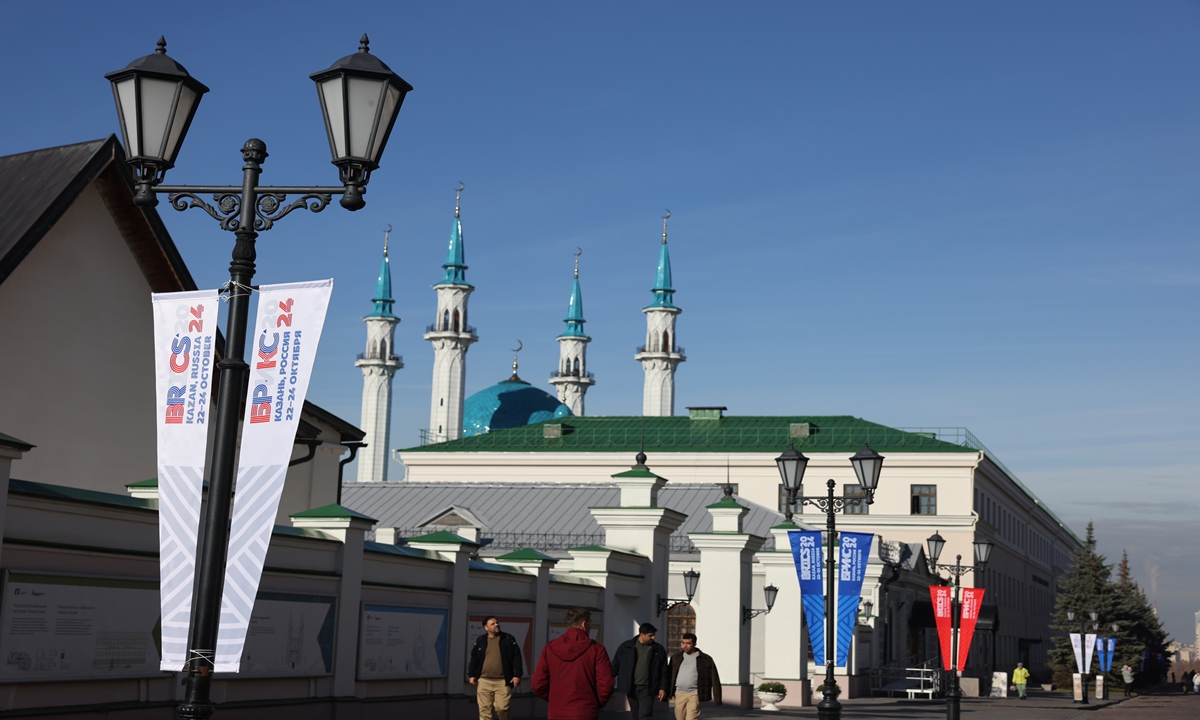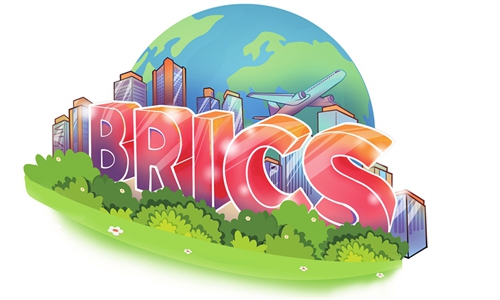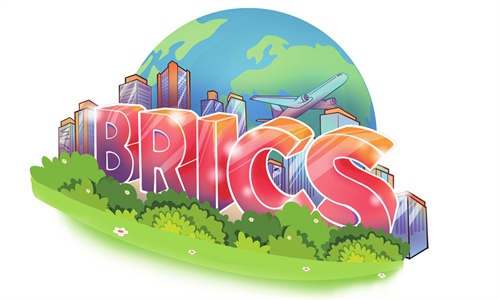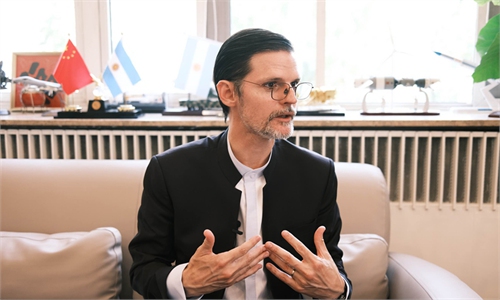
Banners for the BRICS summit hang along the streets of Kazan, Russia on October 20, 2024. Photo: VCG
Editor's Note:
The 2024 BRICS summit is scheduled for October 22-24 in Kazan, Russia. It is the first summit after its expansion. What should we expect from this gathering? What are the reasons behind the surging willingness from more and more countries to join the BRICS mechanism? The Global Times (GT) invited experts from countries that are either members of BRICS or interested in researching this grouping to share their insights.
In the first of this series, Ahmed Moustafa (Moustafa), director of the Asia Center for Studies and Translation in Egypt, talked about how Egypt, which officially joined BRICS at the beginning of this year, will benefit from this move, and the message the popularity of BRICS has sent.
GT: What is your expectation for this year's BRICS summit?
Moustafa: The BRICS summit in Kazan is expected to highlight the crucial role of emerging economies in shaping global economic and political landscapes. The summit is expected to focus on advancing multilateral trade agreements, reducing trade barriers and enhancing cross-border investments. It will also address climate change and sustainable development, formulating a comprehensive action plan aligned with the United Nations Sustainable Development Goals (SDGs). Technological collaboration, particularly digital infrastructure and artificial intelligence, will drive the next wave of economic growth for BRICS nations.
The summit may also facilitate significant advancements in financial cooperation, particularly in the realm of the New Development Bank (NDB) and the Contingent Reserve Arrangement (CRA). These institutions will enhance the financial resilience of BRICS countries, ensuring better management of economic shocks and sustained growth.
GT: What is the significance for Egypt to join the BRICS mechanism?
Moustafa: Egypt's membership in BRICS will significantly impact its economy, trade and diplomatic relations. This membership will accelerate Egypt's development agenda and foster regional stability. Egypt's participation in BRICS will facilitate increased trade and investment flows, particularly in sectors like infrastructure, agriculture and renewable energy.
Collaboration with BRICS member countries will provide Egypt with valuable insights and the best practices in governance and economic management, enhancing its ability to implement effective policies and reforms. The alignment with the interests and objectives of the BRICS nations will strengthen Egypt's influence in international forums and negotiations, particularly in discussions related to global trade, climate change and security. Strategic partnerships through BRICS will facilitate greater collaboration in areas including cybersecurity, space exploration and technology transfer, positioning Egypt as a regional hub for innovation and development. Egypt's enhanced global presence and economic resilience will contribute to a more balanced and equitable world order, reflecting the growing importance of emerging economies on the international stage.
GT: How can BRICS help developing countries during their development process?
Moustafa: The nations will also leverage their collective expertise to foster innovation and technology transfer, equipping developing nations with the necessary tools to advance their economies sustainably.
The BRICS partnership will play a pivotal role in global governance, addressing the multifaceted challenges faced by developing countries through policy coordination and advocacy. By completing their ambitious development agenda, the BRICS nations will demonstrate the efficacy of South-South cooperation in driving sustainable development. Through collaborative research and development initiatives, they will generate innovative solutions to pressing global issues such as climate change and education. Joint projects in renewable energy will lead to the widespread adoption of clean technologies, reducing carbon emissions and promoting environmental sustainability. Additionally, the BRICS nations will collaborate on health initiatives, improving access to affordable and high-quality healthcare services, particularly in rural and underserved areas.
GT: The BRICS mechanism continues to attract emerging countries to join it to enhance the influence and voice of developing countries in the global governance system. What message is BRICS sending out?
Moustafa: This trend signifies growing dissatisfaction with the current international order and a collective desire among emerging economies to reshape global policies. The combined GDP of the BRICS countries has surpassed that of the G7, highlighting the economic clout and potential of this grouping.
BRICS has sent a clear message that the status quo in global governance is no longer acceptable to the majority of the world's population. The success of BRICS initiatives, such as the NDB and the CRA, will provide tangible benefits, solidifying the appeal of the BRICS model.
In the foreseeable future, the BRICS mechanism will evolve into a formidable force. The growing membership and influence of BRICS will send a powerful message that the future of global governance lies in collaborative, inclusive and equitable models.
GT: In what aspects could the BRICS mechanism promote the reform of the existing global governance in the future?
Moustafa: The BRICS mechanism will become a powerful platform for economic and political cooperation among its member states. By 2030, the BRICS nations will have increased their share of global GDP to more than 50 percent, allowing them to advocate for a more equitable distribution of resources and decision-making power in global institutions. The mechanism will also facilitate the creation of new multilateral financial institutions, similar to the NDB and the CRA, providing alternative financing and economic stability to developing nations.
The BRICS mechanism will also promote sustainable development practices and environmental policies, aligning with the United Nations SDGs. Gradually, the BRICS mechanism will solidify its role as a driving force for global economic and political stability, deepen economic interdependence, and address global challenges. The mechanism will also foster technological innovation and digital transformation, laying the foundation for a more equitable and sustainable world.
GT: What is China's role in promoting cooperation under BRICS?
Moustafa: China's role in BRICS is significant. It bolsters infrastructure development projects, increases regional connectivity and trade, and strengthens technological collaboration in areas like artificial intelligence and renewable energy. China has enhanced political and strategic cooperation among BRICS nations, fostering a more cohesive and resilient bloc capable of addressing global challenges. This is achieved through robust multilateral dialogues, specialized committees and mediating conflicts, contributing to regional stability and security.
China will play a leading role in transforming BRICS into a prominent platform for global economic and political cooperation, expanding its influence beyond the member nations. The establishment of the NDB and other financial institutions will provide a viable alternative to Western-dominated financial systems, increasing the bloc's economic clout and autonomy. China will also champion the digitalization of BRICS economies, enhancing productivity and innovation. This forward-looking approach will not only strengthen the economic resilience of BRICS members but also position the bloc as a model for inclusive and sustainable development, gaining widespread international recognition and support.



